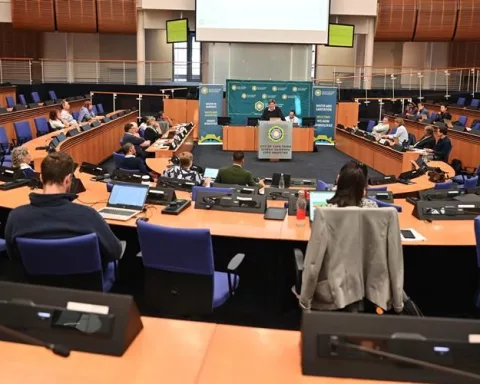The Free State Employment Discussion Summit in South Africa aimed to address joblessness in the region. Minister of Employment and Labour Thulas Nxesi stressed the importance of combating unemployment and facilitating career prospects. The summit highlighted joint service delivery initiatives, career guidance, and assessments to ensure adherence to labor regulations. Nxesi emphasized the need for a collective effort to tackle joblessness, with initiatives such as skills development, partnerships, and job fairs. The summit served as a call-to-action for all stakeholders to participate in this endeavor to create a sustainable and inclusive economy.
A Pragmatic Approach to Unemployment
At the Free State Employment Discussion Summit, Minister of Employment and Labour Thulas Nxesi emphasized the vital mission of combating pervasive joblessness and facilitating career prospects in the Free State’s job market. Nxesi highlighted the joint service delivery initiative, career guidance, and recurrent assessments conducted to guarantee employers’ adherence to labor regulations.
During the early morning hours of January 24, 2024, a momentous assembly took place in South Africa’s Free State province. Multiple influential individuals from different economic sectors gathered at the Free State Employment Discussion Summit, a gathering spearheaded by the Minister of Employment and Labour, Hon Thulas Nxesi himself.
A Pragmatic Approach to Unemployment
Nxesi, renowned for his realistic and forward-thinking policies, was the central character of the assembly. His speech emphasized the vital mission at hand: combating pervasive joblessness and facilitating career prospects in the Free State’s job market. The summit signaled the culmination of an intense week of a career fair, service delivery, and inspection program.
The Minister narrated the occurrences of the previous days, incorporating the joint service delivery initiative in association with numerous government departments, private sector firms, and academic institutions. This effort materialized initially at Thaba Nchu’s Barolong Hall, then at Botshabelo, locations where career guidance was dispensed to a substantial pool of job hunters.
Nxesi indicated that the objective of these endeavors was to aid job hunters in their search and expressed optimism that employers would extend interview invitations to these individuals. He underscored the recurrent assessments conducted to guarantee employers’ adherence to labor regulations, voicing unease about the subpar compliance levels witnessed.
Tackling Youth Unemployment: A Global Challenge
The Minister, acclaimed for his proactive methods, was resolute in his dedication to resolving youth unemployment, an issue shared by several countries globally. As South Africa grapples with high education and training systems dropout rates and high unemployment, Nxesi recognized the precarious position of the youth in the job market. He pointed out that this issue is a looming crisis and poses a significant threat to South Africa’s societal stability.
Yet, Nxesi and his team are far from passive. The Minister spotlighted various initiatives such as the Jobs and Career Fairs, formulated to acquaint the youth with job opportunities. The launch of advanced mobile units to aid job seekers, collaboration with the Department of Higher Education and Training (DHET) and the Department of Basic Education (DBE) on an initiative financed by the European Union, are some of the measures undertaken.
Skills Development: A Key to Tackle Unemployment
Nxesi emphasized the significance of skills development as a strategy to tackle joblessness. Particularly in the era of the fourth industrial revolution marked by growing automation and digitization, upskilling, and reskilling are critical to adapt to the evolving labor market needs.
To combat joblessness, the Minister stressed the importance of cooperative partnerships and establishing robust ties among employers, education providers, and the youth. He believed this would foster skills essential for entry-level jobs in expanding sectors. He further urged employers to document vacancies and training opportunities in their ESSA system and encouraged their participation in introduced initiatives such as the Presidential Youth Employment Initiative and the National Pathway Management.
Collective Effort: The Key to Success
The Free State Employment Discussion Summit was more than just an exchange of ideas; it was a tangible representation of a joint effort to confront joblessness and foster a sustainable and inclusive economy. As Thulas Nxesi eloquently articulated, tackling joblessness is not solely an economic mission but also a societal one. The most effective social welfare measure is indeed a job, offering individuals the autonomy and income essential for developing their livelihoods and communities.
As the summit wrapped up, it was abundantly clear that confronting joblessness demands a collective effort. It was apparent that the journey ahead isn’t the sole responsibility of the government, trade unions, community organizations, or employers. The challenge of unemployment belongs to everyone. With the initiatives proposed by Minister Nxesi, South Africa appears set to effectively combat this pandemic of unemployment. This gathering stood testament to the government’s commitment to address joblessness and served as a call-to-action for all stakeholders to partake in this endeavor.
1. What was the Free State Employment Discussion Summit about?
The Free State Employment Discussion Summit aimed to address joblessness in the region of South Africa’s Free State province.
2. Who organized the summit?
The summit was spearheaded by the Minister of Employment and Labour, Hon Thulas Nxesi.
3. What initiatives were highlighted at the summit to combat unemployment?
The summit highlighted joint service delivery initiatives, career guidance, and assessments to ensure adherence to labor regulations. Other initiatives included skills development, partnerships, and job fairs.
4. What is the significance of skills development in tackling unemployment?
Skills development is critical in the era of the fourth industrial revolution marked by growing automation and digitization. Upskilling and reskilling are essential to adapt to the evolving labor market needs.
5. Why is tackling youth unemployment particularly important?
Youth unemployment is a looming crisis and poses a significant threat to South Africa’s societal stability. High education and training systems dropout rates and high unemployment are shared issues by several countries globally.
6. What was the main message conveyed by the Minister of Employment and Labour at the summit?
The main message conveyed by the Minister of Employment and Labour was the need for a collective effort to tackle joblessness, with initiatives such as skills development, partnerships, and job fairs.











